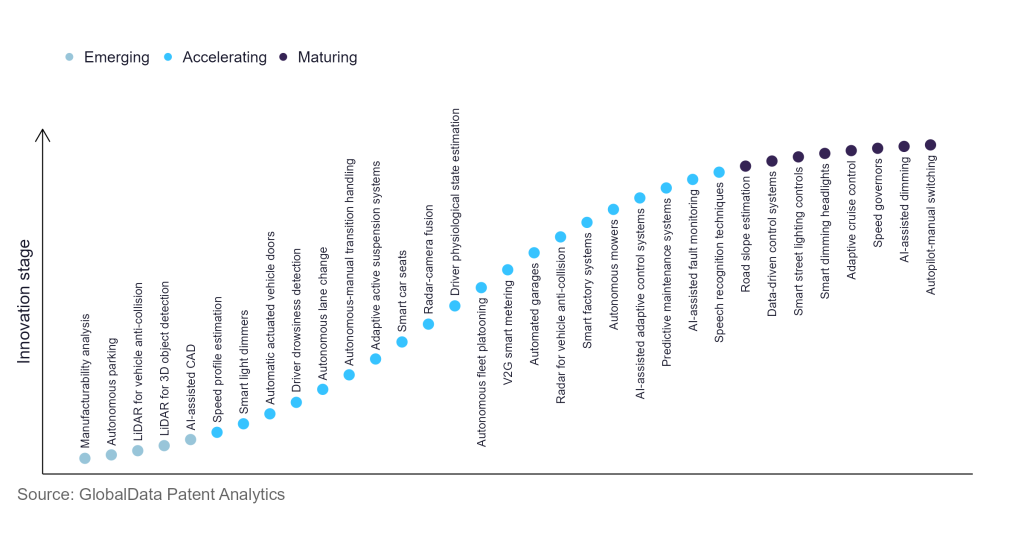The automotive industry continues to be a hotbed of innovation, with activity driven by autonomous vehicles, connected vehicles and safety concerns], and growing importance of technologies such as solid-state LiDAR systems and advanced signal-processing algorithms. In the last three years alone, there have been over 1.2 million patents filed and granted in the automotive industry, according to GlobalData’s report on Artificial intelligence in Automotive: LiDAR for vehicle anti-collision. Buy the report here.

Discover B2B Marketing That Performs
Combine business intelligence and editorial excellence to reach engaged professionals across 36 leading media platforms.
However, not all innovations are equal and nor do they follow a constant upward trend. Instead, their evolution takes the form of an S-shaped curve that reflects their typical lifecycle from early emergence to accelerating adoption, before finally stabilising and reaching maturity.
Identifying where a particular innovation is on this journey, especially those that are in the emerging and accelerating stages, is essential for understanding their current level of adoption and the likely future trajectory and impact they will have.
290+ innovations will shape the automotive industry
According to GlobalData’s Technology Foresights, which plots the S-curve for the automotive industry using innovation intensity models built on over 619,000 patents, there are 290+ innovation areas that will shape the future of the industry.
Within the emerging innovation stage, manufacturability analysis, autonomous parking, and lidar for vehicle anti-collision are disruptive technologies that are in the early stages of application and should be tracked closely. Speed profile estimation, smart light dimmers, and driver drowsiness detection are some of the accelerating innovation areas, where adoption has been steadily increasing. Among maturing innovation areas are road slope estimation and adaptive cruise control, which are now well established in the industry.
Innovation S-curve for artificial intelligence in the automotive industry

LiDAR for vehicle anti-collision is a key innovation area in artificial intelligence
LiDAR is a critical sensing technology for autonomous vehicles due to its ability to produce a high-resolution mapping of objects in relation to the vehicle. LiDAR sensors transmit a laser pulse, detect the backscattered or reflected light energy, and calculate the distance to the object based on the elapsed time. The technology is useful in detecting road features, such as curbs and lane markings, as well as in tracking objects in proximity to a vehicle.
GlobalData’s analysis also uncovers the companies at the forefront of each innovation area and assesses the potential reach and impact of their patenting activity across different applications and geographies. According to GlobalData, there are 140+ companies, spanning technology vendors, established automotive companies, and up-and-coming start-ups engaged in the development and application of LiDAR for vehicle anti-collision.
Key players in LiDAR for vehicle anti-collision – a disruptive innovation in the automotive industry
‘Application diversity’ measures the number of different applications identified for each relevant patent and broadly splits companies into either ‘niche’ or ‘diversified’ innovators.
‘Geographic reach’ refers to the number of different countries each relevant patent is registered in and reflects the breadth of geographic application intended, ranging from ‘global’ to ‘local’.
Robert Bosch Stiftung is a key player in the LiDAR for vehicle anti-collision innovation area. It has developed production-ready LiDAR sensors, which will enable vehicles to detect objects of different finishes, shapes, and sizes over a long range and wide field of vision, giving sufficient time for vehicle steering and braking systems to react in a safe manner. Bosch believes its long-range LiDAR will meet all the safety requirements for automated driving. Alphabet, Ford, General Motors, Toyota and Aptiv are some of the other key players.
To further understand how artificial intelligence is disrupting the automotive industry, access GlobalData’s latest thematic research report on Artificial Intelligence (AI) in Automotive.
Data Insights
From

The gold standard of business intelligence.
Blending expert knowledge with cutting-edge technology, GlobalData’s unrivalled proprietary data will enable you to decode what’s happening in your market. You can make better informed decisions and gain a future-proof advantage over your competitors.





